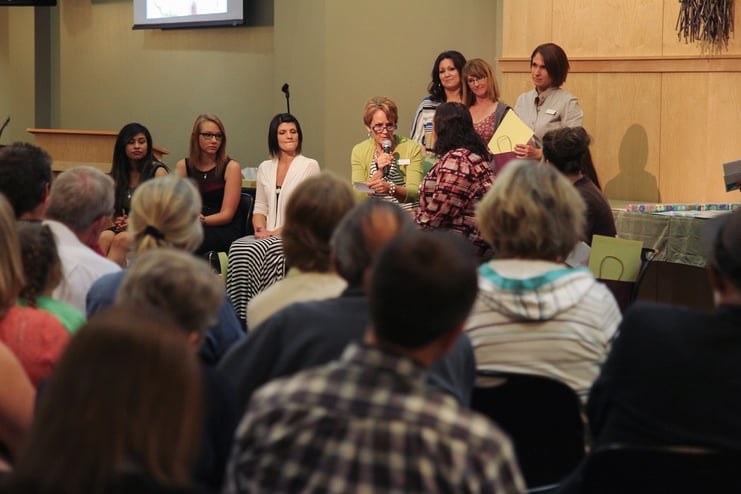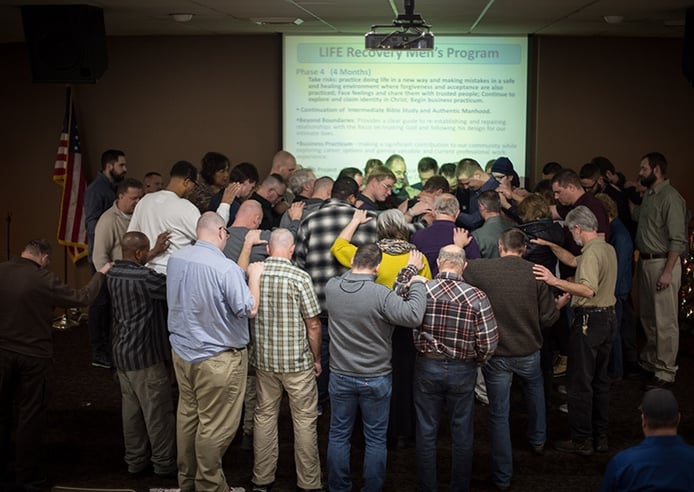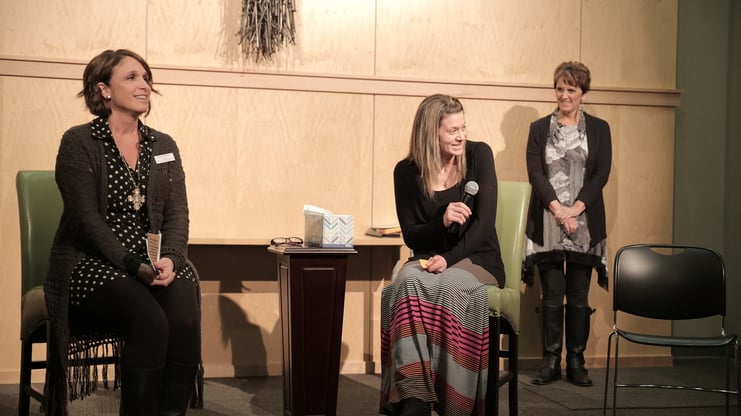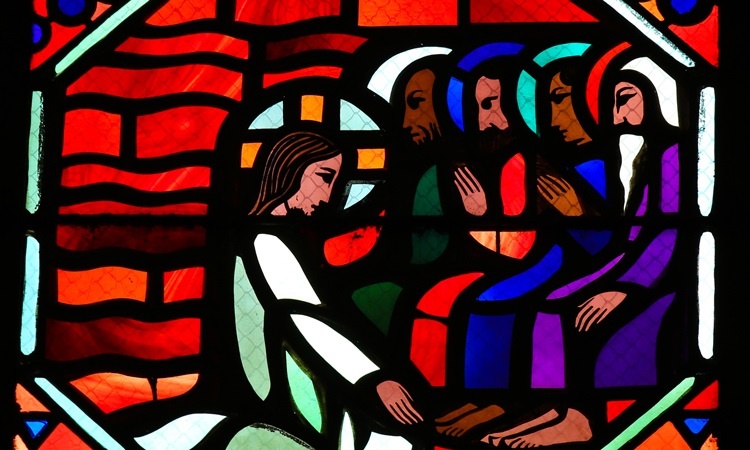2 min read
Gospel-Centered from the Start
“Let us hold unswervingly to the hope we profess, for He Who promised is faithful…Jesus Christ is the same yesterday, today, and forever.” (Hebrews...
5 min read
 Barbara Comito, former marketing director
:
January 10, 2017
Barbara Comito, former marketing director
:
January 10, 2017
By Barbara Comito, UGM Marketing Director
Who would ever read a blog post on Total Accountability? My staff said they wouldn’t. (So I changed the title. Tricky me.)
Being held accountable is like lima beans or dental floss or stomach crunches…You know it’s good for you, but you hate it. At least I do. I don’t want to be called out on my stuff. I really don’t. Even more, though, at some really deep gut level, I don’t want to wander off the map into a deadly mire of selfishness, jealousy and rebellion – accountable only to myself. Deep down, I know I need help to be who I really want to be.
“Prone to wander, Lord, I feel it. Prone to leave the God I love.” (Lyric from “Come Thou Fount of Every Blessing”)
According to Merriam-Webster, accountability is pretty much synonymous with accepting responsibility.
Accountability: the quality or state of being accountable; especially: an obligation or willingness to accept responsibility or to account for one’s actions. (Don’t you just hate it when dictionaries use a form of the word to define the word? Argh.)
Accountable: subject to giving an account: answerable
Account: a statement explaining one’s conduct

We here at UGM use the phrase “Total Accountability” in a more expansive way. Accepting responsibility for one’s own actions is the start, but our definition goes much deeper and wider. We mean:
Men and women involved in UGM’s recovery programs, both participants and staff, put these principles into practice every day through the self-evaluation process (a tool created by Grace Network International). They answer questions about how decisions they made drew them further from or closer to the standard of Christ-likeness and how their decision impacted the community in which they live. They then read their answers in front of others in the program and invite questions so that they can fully evaluate their behavior. Talk about tough work – but they’re committed, because accountability is one of the most important difference-makers for people living in recovery.
Some people complete our long-term recovery program, solid by all appearances, but then they try to go it on their own. In these situations, they nearly always fail because they’ve neglected accountability.
That’s the beauty of ongoing support groups like AA, NA, Celebrate Recovery, and UGM’s new endeavor, Recovery for Life. Frankly, when it’s working correctly, that’s also the beauty of the church. We are the Body of Christ – here to love, encourage, uphold, bear one another’s burdens and exhort – which bring us to the most important piece of this post: Accountability isn’t only important for people in recovery; it’s imperative for all of us.
“And let us consider how we may spur one another on toward love and good deeds, not giving up meeting together, as some are in the habit of doing, but encouraging one another – and all the more as you see the Day approaching” (Hebrews 10:24-25).
At first glance, accountability may appear to diminish personal freedom: I have my own relationship with God. If I’m doing something wrong, the Holy Spirit will convict me. I don’t need other people to tell me what to do. It’s me and God. We’re in this together, and no one else has the right to interfere with that.
Hmm…there’s some truth there. The Holy Spirit is at work in the life of the believer – convicting and giving counsel. As Christians, we have direct access to God. “Therefore, brothers and sisters, since we have confidence to enter the Most Holy Place by the blood of Jesus…let us draw near to God with a sincere heart and with the full assurance that faith brings…” (Hebrews 10:19-22). You and I can come boldly to the throne of God. We can talk directly to him, and we can listen for his response. But our relationship with him doesn’t take place in a vacuum. Just a few verses later, the passage quoted above says we should not neglect meeting together because we need encouragement. The metaphor of the church as the Body of Christ, as described in Ephesians and elsewhere, rules out the idea of “just me and God” to the exclusion of everyone else.
UGM recovery counselor Yvonne Wilhelm explains how freedom and accountability fit together: “True freedom is not the ability to do as we please but to do what we have seen Christ and others do: walk in obedience. The victory comes when we submit our life and our will to God, confess to others about our behaviors that draw us away from Christ and ask the Holy Spirit to convict us and move us toward change. We need to ask one or more trustworthy people to hold us accountable for the changes we want to make.”
Scripture encourages us to confess our sins to each other so that we might pray for one another and be healed (James 5:16).
Questions to consider: What type of accountability do you have built into your life? Who do you trust to speak the truth in love to you? Is there someone (or a group of people) to whom you regularly confess your sins and ask them to pray for you?

You know the passage about the log in your own eye and the speck in your brother’s? Judgment is a big topic, certainly big enough for its own blog post, but for now, I just want to make a critical point with regard to accountability versus judgment.
Accountability starts with me building a support group of trustworthy people – people who I know are walking with Christ and working on their own stuff – and inviting them into my life.
Accountability does not start with me setting myself up as the policeman or judge of Christ-like behavior – going around calling everyone else on their stuff. There may be a time and a place for confronting someone who has not invited us to do so, but it is rare and certainly requires that we are seeking accountability ourselves.
Even in a trust-based accountability group, my manner of approach is also important. It shouldn’t be, “here’s what you’re doing wrong,” Yvonne says. Christian accountability says, “This is not who you are. This is what you are doing, and it is drawing you away from who God says you are and what he wants for you. How can I help?”
If your answers to the earlier questions left you thinking you need to build more accountability into your life, here are some possible next steps:
Next up: How does UGM exercise Total Accountability?
Part of creating healthy accountability is understanding who people really are, not just who they appear to be or what others call them. Delve deeper with our free "Lose the Label" Study Guide by clicking below.

2 min read
“Let us hold unswervingly to the hope we profess, for He Who promised is faithful…Jesus Christ is the same yesterday, today, and forever.” (Hebrews...

9 min read
To celebrate 75 years of serving the Inland Northwest, we are spending the year remembering our history and the faithfulness that built us and...

2 min read
In 2026, Union Gospel Mission Inland Northwest is approaching our 75th Anniversary! This is a milestone that invites gratitude and reflection, and...

This is part of a series on UGM's Core Values. Read a variety of staff members' musings on God-dependence, Christ-likeness, Pursuing Excellence, ...

By Sonny Westbrook, UGM Director of Ministries One of the core values we hold dear here within UGM is Christ-likeness. Christ-likeness is the...